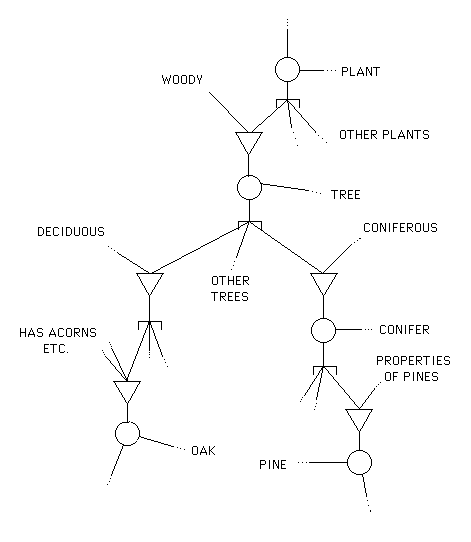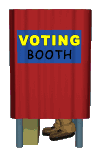The Complete Folksonomies Overview
 Folksonomies (plural of folksonomy) are bottom-up
taxonomies that groups create on their own, as opposed to being created by an
individual. Synonyms include mob indexing, folk categorization, social tagging,
federated tagging, lazy tagging, folksonomy, tagsonomy, tagonomy, free tagging,
distributed classification, post coordinate indexing, collective indexing,
user-generated tagging and ethnoclassification. They are,
in effect, grassroots classification systems for data.
Folksonomies (plural of folksonomy) are bottom-up
taxonomies that groups create on their own, as opposed to being created by an
individual. Synonyms include mob indexing, folk categorization, social tagging,
federated tagging, lazy tagging, folksonomy, tagsonomy, tagonomy, free tagging,
distributed classification, post coordinate indexing, collective indexing,
user-generated tagging and ethnoclassification. They are,
in effect, grassroots classification systems for data.
In the past metadata (data about data) was created either
by professional librarians using complex and lengthy rule sets (e.g., Dewey
Decimal System or Library of
Congress book index), or by the authors of the data itself (e.g., indices in the
back of books). Folksonomies are created a third way, by the collaborative
effort of the document users themselves.
The author of the seminal work on folksonomy and
folksonomies is Peter Merholz, although he prefers not to use the terms folksonomy
and ethnoclassification. He also describes userexperience,
tagging, taxonomy, socialsoftware and facets. The
creator of the word folksonomy is reported by Salon to be Thomas Vander Wal. The
author of an important work on Folksonomies is Adam Mathes of the University of
Illinois Urbana - Champaign. His December 2004 paper titled Folksonomies -
Cooperative Classification and Communication Through Shared Metadata
examined user-generated metadata as implemented in
http//de.licio.us
("Delicious") and http//flickr.com.
Delicious is a "social bookmarks manager." It allows the
user to add sites to his personal list, annotate those sites with self-selected
keywords and share the list.
 Flickr,
purchased in March 2005 by Yahoo, is a photograph annotation and sharing system. It
allows the user and his/her friends to store and share photos online, and to add
keywords to photos.
Flickr,
purchased in March 2005 by Yahoo, is a photograph annotation and sharing system. It
allows the user and his/her friends to store and share photos online, and to add
keywords to photos.
Both Delicious and Flickr are free to join, although
Flickr has a value-added option that the user can purchase. Striatic, a Flickr
member, has written two articles
about how to use tags most effectively..
Each system has its limitations, including limited or
non-support of multi-word tags and lack of synonym control. One feature of
folksonomies is their uncontrolled nature, another is their organic growth.
One could argue that search engines like Google and
LookSmart are the ultimate automated folksonomies, since they index the vastness
of the world wide web along with other data. GMail is not folksonomy because a
person cannot add terms to the index.
 From Robin Good:
From Robin Good:
"A folksonomy represents simultaneously some of the best and worst in the organization of information.
"Its uncontrolled nature is fundamentally chaotic, suffers from problems of imprecision and ambiguity that well developed controlled vocabularies and name authorities effectively ameliorate.
"Conversely, systems employing free-form tagging that are encouraging users to organize information in their own ways are supremely responsive to user needs and vocabularies, and involve the users of information actively in the organizational system.
"Overall, transforming the creation of explicit metadata for resources from an isolated, professional activity into a shared, communicative activity by users is an important development that should be explored and considered for future systems
development...."
Steve Reubel, a Public Relations Strategist, states that
Folksonomies are both a threat and an opportunity to companies. They can be used
to generate positive buzz about a product, but they can also lead to the
inadvertent release of company secrets.
Steve also notes that Metafilter, a popular community
weblog, has incorporated tags into their site. One of their pages lists the Top
150 Tags. Other tagged sites include Furl, Technorati, with perhaps OhMyNews,
Kuro5shin and even Slashdot to follow soon. He
foresees the day when Google
AdSense might incorporate tags across websites, a phenomenon he calls Tagtextual
Advertising.
This
article in Wired News (Feb. 1, 2005) by Daniel Terdeman makes a
distinction between Broad Folksonomies and Narrow Folksonomies. A
broad folksonomy is where many people tag a few objects, while narrow
folksonomies are where one or few persons tag many objects.
A dispatch in the February 22, 2005 issue of
SearchViews describes Vimeo, a video
verson of Flickr. When it emerges from
closed beta Vimeo will let you organize and share video clips. The site uses folksonomic methods
(tags) to help users locate video clips. Some sample video clips are available
now.
Matt Locke has an insightful Feb 25, 2005, piece
which argues, among other things, that folksonomies are useful only "in
a context in which nothing is at stake." A lively discussion ensued here
on March 1.
Tagsy is a social bookmarking and feed management service that integrates with
Firefox.
Wired Online carried a thoughtful story about
folksonomies, Order
Out of Chaos, by Bruce Sterling:
What's the best way to tag, bag, and sort data? Give it to the
unorganized masses.
We used to rely on philosophers to put the world in order.
Now we've got information architects. But they're not doing the work - we are.
There's a revolution going on in the art and science of categorization, and
its name is folksonomy....
A March 23, 2005 article
on CNetAsia contains the prediction that free tagging will revolutionize web
search.
WebProNews ran an interview
with Steve Rubel ("arguably the most prominent and influential blogger in
the PR profession either side of the Atlantic.") in their 3/26/2005
edition. He promotes folksonomies as a way to make information find-able, and as
a way for marketers to judge how folks feel about their products. He compares
them to a 24/7 focus group, "incredibly powerful."
Engadget
on April 29, 2005, described a new folksonomy / physical location tool: Combining
this whole folksonomies thing with Google Maps, FoundCity is a new group mapping
tool for cellphones...As in, when you’re walking around the city and see
street art you like you can attach it to pre existing tags (i.love.you,
street.art), or start your own tags, like “acupuncture.videos” that go in a
citywide database — like del.icio.us for the city....
The Need
for Creating Tag Standards (Jan. 15, 2007) explores how different social
bookmarking sites use different, incompatible tagging standards and comes up
with a pessimistic conclusion: Basically, it’s too late for a tagging
standard that will be used unanimously throughout the web. A truly semantic web
most certainly won’t ever exist because of the reluctance to change and the
unwillingness to compromise and accept defeat. A semantic web requires objective
analysis of methods and data, culminating in honestly evaluated options, and
immediate acceptance of the outcome. But that’s never going to happen.
Folksonomies are lower in cost than other taxonomic
systems and in many ways more useful, and their use seems destined to continue and
expand in the future.
 Folksonomies (plural of folksonomy) are bottom-up
taxonomies that groups create on their own, as opposed to being created by an
individual. Synonyms include mob indexing, folk categorization, social tagging,
federated tagging, lazy tagging, folksonomy, tagsonomy, tagonomy, free tagging,
distributed classification, post coordinate indexing, collective indexing,
user-generated tagging and ethnoclassification. They are,
in effect, grassroots classification systems for data.
Folksonomies (plural of folksonomy) are bottom-up
taxonomies that groups create on their own, as opposed to being created by an
individual. Synonyms include mob indexing, folk categorization, social tagging,
federated tagging, lazy tagging, folksonomy, tagsonomy, tagonomy, free tagging,
distributed classification, post coordinate indexing, collective indexing,
user-generated tagging and ethnoclassification. They are,
in effect, grassroots classification systems for data. Flickr,
purchased in March 2005 by Yahoo, is a photograph annotation and sharing system. It
allows the user and his/her friends to store and share photos online, and to add
keywords to photos.
Flickr,
purchased in March 2005 by Yahoo, is a photograph annotation and sharing system. It
allows the user and his/her friends to store and share photos online, and to add
keywords to photos. From Robin Good:
From Robin Good: